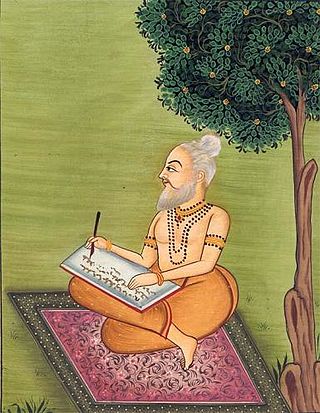Valmiki
legendary Indian poet, author of the Ramayana From Wikipedia, the free encyclopedia
Maharishi Valmiki (Sanskrit: वाल्मीकि, vālmīki) (during Lord Rama's time)[1] is celebrated as the poet harbinger in Sanskrit literature. He is the author of the epic Ramayana, based on the attribution in the text of the epic itself.[2] He is revered as the Adi Kavi, which means First Poet, for he discovered the first śloka i.e. first verse, which set the base and defined the form to Sanskrit poetry.
Maharishi Valmiki | |
|---|---|
 Maharishi Valmiki composing the Ramayana. | |
| Honors | Revered as the Adi Kavi, which means First Poet, for he discovered the first śloka. |
| Religious life | |
| Philosophy | Religious movement called Valmikism is based on Valmiki's teachings. |
| Composed Ramayana | |
At least by the 1st century AD, Valmiki's reputation as the father of Sanskrit classical poetry seems to have been legendary.
Role in Ramayana
Valmiki played an important role in Uttara Kanda, the last chapter of epic Ramayana. It is believed that The Uttara Kanda was not original work of Valmiki. It is believed to be taken up from Sesha Ramayana. According to the legend Rama send Sita to forest. Sita finds refuge in Sage Valmiki's ashram, where she gives birth to twin boys Lava (founder of Lahore) and Kusha (founder of Kasur) . Lava and Kusha were Valmiki's first disciples to whom he taught the Ramayana. Bala Kanda of the epic also telling the story of Valmiki narrating the Ramayana to his disciples Lava and Kusha.[3]
Related pages
- Rishi
- Kashyapa
- Atri
- Vashitha
- Vishvamitra
- Gautam
- Jamdagni
- Bharadvaja
References
Wikiwand - on
Seamless Wikipedia browsing. On steroids.
